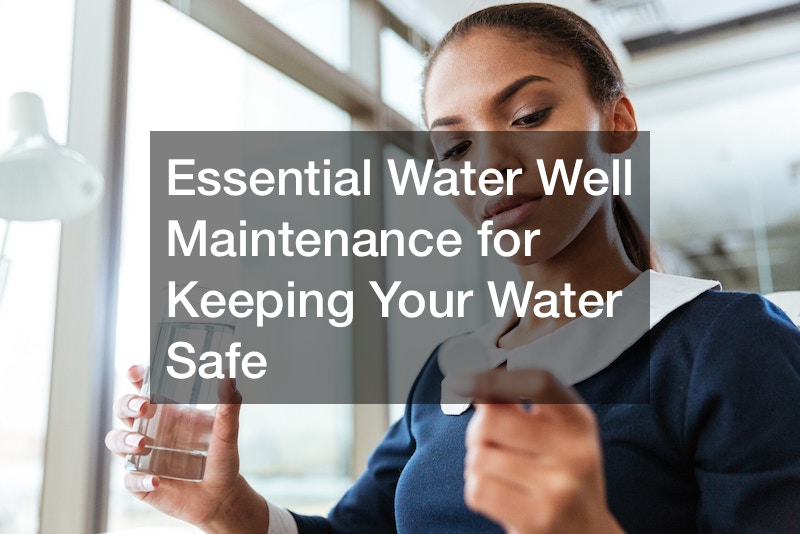
While you may not think about it often, your water well is an important part of your home. It offers a safe, reliable source of water that isn’t subject to the same fluctuations and contaminants as public water sources. But your well doesn’t take care of itself! It’s important to perform regular maintenance to ensure that your water stays clean and safe.
Additionally, water well maintenance can help extend your well’s life and prevent problems with your well in the future. Here are a few essential water well maintenance tasks you can perform on your well to keep it functioning properly and ensure your water is safe.
1. Well Water Basics
As the old saying goes, an ounce of prevention is worth a pound of cure. This is especially true when it comes to your water well. Keeping your well maintained is essential to keeping your water safe. You can do a few basic things to keep your well water safe.
- Have your well’s water regularly tested for bacteria and other contaminants. Your local health department can guide you on how often to test your water.
- Check your well regularly for any signs of damage or wear and tear. If you notice anything unusual, be sure to have it checked out by a professional. Well installers are qualified professionals who can help you maintain your well and keep your water safe.
- If you notice any changes in your well water, such as a change in taste, odor, or color, you should contact your local health department or a qualified well professional.
- You should also have your well’s water tested if you plan to use it for irrigation. Irrigation water can contain harmful bacteria that can contaminate your crops.
Following these simple but essential water well maintenance tips can help keep your well water safe and clean.
2. Inspection and Regular Maintenance

If you rely on a water well for your home, you know how vital it is to keep it in good working condition. Not only is it essential for your daily life, but it’s also important for your family’s safety.
That’s why inspection and regular maintenance are essential for water well safety. The National Ground Water Association recommends having your well inspected at least once a year to keep your water well running smoothly and prevent contamination. In addition, you should perform regular maintenance on your well, including testing the water quality and ensuring the well is properly sealed.
While it’s important to have a professional inspect your well periodically, there are some things you can do to keep it in good shape between inspections. One of the most crucial things you can do is to ensure the area around your well is free of debris and any potential sources of contamination. If you have an irrigation system, it’s also important to have it serviced regularly. Irrigation services can help ensure your well is operating properly and not introducing contaminants into your water supply.
Following these essential water well maintenance tips can help keep your well safe and ensure that your family has clean drinking water.
3. Identifying a Problem
Water well maintenance is essential in helping you avoid more expensive repairs by identifying a problem early. Watch for the following signs that your well might have a problem:
- Your water has a strange taste or smell.
- There’s a sudden drop in water pressure.
- Your water is discolored.
- Main line clogs. This happens due to a blockage in the main line that supplies water to your home.
- There are leaks around the slab. If you notice a leak, you should contact a slab leak detection company to have your well inspected.
If you notice any of these problems, don’t panic – but do contact a water well professional immediately. They’ll diagnose the issue and recommend the best action to get your water source back into working order.
4. Planning the Project

One essential water well maintenance task is planning the project. Before you start any work on your well, you need to develop a plan. This will help you avoid potential problems and ensure that the work is done correctly. Consult with excavation contractors and other professionals to get the best advice for your particular situation.
- First, you should decide what you want to achieve with the project. Are you simply trying to maintain your borehole properly, or are you looking to improve its performance?
- Next, you need to gather some basic information. This includes the depth of your well, the diameter of the casing, and the location of the wellhead.
Once you have this information, you can start to develop your plan. You will need to identify the project’s goals and determine the best way to achieve those goals. For example, if you’re trying to maintain your well, you may only need to inspect it once a year. However, if you want to improve its performance, you may need to do more frequent inspections.
By taking these essential water well maintenance steps, you can avoid potential problems and keep your water well working properly for years to come.
5. Material and Tools
Water well maintenance is critical to ensuring your water is safe. While many think water spring maintenance is difficult and expensive, it can be simple and affordable if you have the right materials and tools.
- First and foremost, you’ll need a good quality water test kit. This will help you test for contamination and ensure your water is safe to drink.
- You’ll also need basic tools, like a screwdriver, wrench, and pliers. These will come in handy for things like tightening fittings and replacing parts.
- Finally, you’ll need materials like bleach, chlorine, and well sanitizer to clean your well. These will help keep your water clean and free of contaminants.
Another important part of water well maintenance is keeping your tools and equipment clean. If you use your tools and equipment in dirty water, you could contaminate your well. Make sure you clean your tools and equipment after every use.
With these tools and materials, you’ll be well on your way to keeping your water well-maintained and safe to drink. Of course, you may need to rent some of these tools and equipment if you don’t have them. Thankfully, most hardware and water well supply stores offer equipment rental and tool rental services, so finding what you need shouldn’t be a problem.
6. Working Around Pipes
One important part of water well maintenance is working around pipes. If you have a borehole, you likely have pipes that run from your well to your home. These pipes can be buried underground and can be difficult to reach. If you need to replace or repair a pipe, it’s best to hire a professional to do the job. Concrete cutting may be necessary to access the pipes.
Here are some essential water well maintenance tips for working around pipes:
- Use caution when working around water pipes.
- Be aware of your surroundings and know where the water pipes are located.
- When excavating around water pipes, use hand tools instead of power equipment to avoid damaging the pipes.
- If you must use power equipment, use caution and ensure you don’t damage the pipes.
- If you damage a water pipe, stop work immediately and call a qualified repair professional to fix the problem.
Pipes are essential to your water well system. Keeping them in good condition is one of the most crucial maintenance tasks you need to perform regularly to ensure your water is safe.
7. Repairs

Well repairs are one of the most essential water well maintenance tasks you can perform. If you notice anything wrong with your well, it’s important to have a professional take a look at it as soon as possible. Some common problems that require repairs include leaks, cracks, and collapsed pipes. These problems can cause your well to lose water, leading to several other problems.
Depending on the problem, repairs can be simple or more complex. For example, something as simple as a clogged filter can be easily fixed, while more complex issues like well pump repairs may require the help of a professional.
Maintaining your water well is important regardless of the requisite repairs. Doing so will ensure that your water is clean and safe for you and your family.
8. Cleaning Up
You can never be too clean when it comes to your water well. That’s why cleaning up your reservoir is one of the essential water well maintenance tasks. You can do a few simple things to clean up your wellspring and keep it running smoothly.
- Keep the area around your water well clean and free of debris, vegetation, and trash. This will help keep your wellspring from becoming contaminated.
- Keep an eye on your wellhead. Make sure there is no debris or sediment buildup around it.
- Clean up any spills or contamination immediately. This will help prevent contamination of your water supply.
- Sanitize the well regularly.
Dump trailers can be a great way to maintain your well. They can be used to haul away debris and trash and to transport heavy equipment for servicing your well.
Cleaning up your water well is essential to keeping your water safe. By taking these essential spring water maintenance steps, you can help ensure that your water is free of contaminants.
9. Securing Your Well

As a well owner, you are responsible for the maintenance and upkeep of your water well. Depending on the location of your well, it may be susceptible to contamination from runoff, flooding, or other sources. Here are some simple steps to secure your well and help protect your drinking water from pollution.
- Ensuring the well casing (the pipe that extends from the ground surface to the top of the well) is properly sealed to the surrounding surface with cement-based grout.
- Installing a well cap or cover that is tightly fitting and in good condition. The well cap prevents debris and contaminants from entering the well.
- Consider placing a screen or grating over the well opening to keep out smaller animals.
- Install a reliable backflow prevention device to prevent contaminated water from flowing back into your well. Make sure your backflow prevention device is tested yearly to ensure that it is functioning properly.
By taking some essential water well maintenance steps to secure your well, you can help to protect your drinking water from contamination.
10. Keeping a Well Log
One of the most crucial things you can do to maintain your well is to keep a well log. This is a record of all the activities that have taken place at the well, including any maintenance that has been done. This log can be extremely helpful if there are any problems with your well.
The well log should include information on the construction of the well and any repairs or modifications that have been made. It’s also important to keep track of any changes in the water level, as well as any changes in the quality of the water.
Keeping a well log may seem tedious, but it’s an essential water well maintenance task to ensure that your well is running smoothly and your water is safe. Plus, it can be helpful when you have any questions or concerns about your well. So, don’t be afraid to break out that notebook and start logging!
Bottom Line
So, there you have it; a few essential water well maintenance tips for keeping your water well safe and clean. By performing regular maintenance and being on the lookout for early signs of trouble, you can ensure that your well will provide you with many years of safe, potable water.
If you need help with properly maintaining your well, several resources are available to help you. Your local water utility, the Department of Health, or the Environmental Protection Agency (EPA) can provide you with information and offer guidance on what you need to do to keep your well safe. Take action today and protect the precious source of life – water is life, isn’t it?


